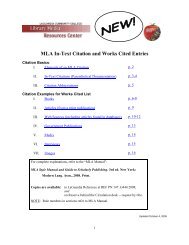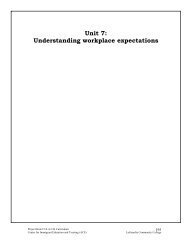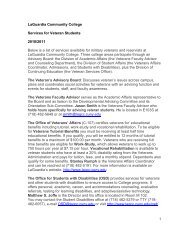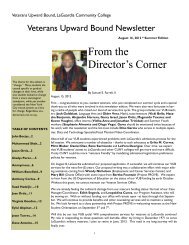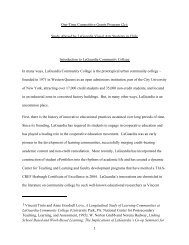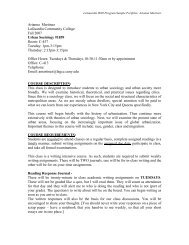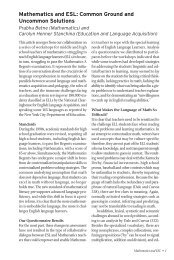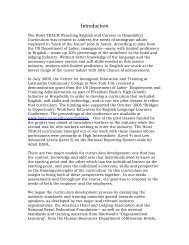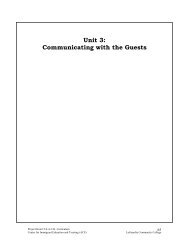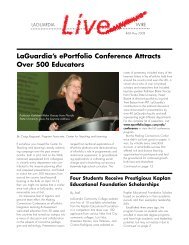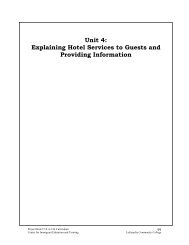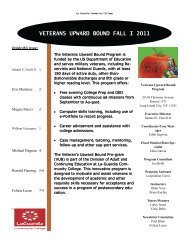COURSE INDEX - LaGuardia Community College
COURSE INDEX - LaGuardia Community College
COURSE INDEX - LaGuardia Community College
Create successful ePaper yourself
Turn your PDF publications into a flip-book with our unique Google optimized e-Paper software.
Mathematics, Engineering, and Computer Science Department<br />
the Pre-algebra portion and between 40 and 54 inclusive on the<br />
Algebra portion.<br />
Note: A student may be placed in MAT200 with COMPASS<br />
scores of 35 or higher on the Pre-algebra portion and 55 or<br />
higher on the Algebra portion.<br />
MAT120 Elementary Statistics I<br />
3 credits; 4 hours (3 lecture, 1 lab)<br />
This course presents the fundamental concepts and computational<br />
techniques of elementary statistics. Topics studied include statistical<br />
graphs, measures of central tendency, standard deviation, percentiles,<br />
probability, binomial and normal distributions,<br />
confidence intervals, hypothesis testing, and linear correlation/<br />
regression. Students will use a statistical software package to<br />
obtain basic sample statistics and graphs for data analysis. A<br />
graphing calculator will be used for routine computations.<br />
Prerequisite: CSE099, MAT096<br />
MAT121 Elementary Statistics II<br />
3 credits; 3 hours<br />
As a sequel to MAT120, this course develops the methods of<br />
statistical inference including experimental design, sampling,<br />
estimation, hypothesis testing and decision making.<br />
Prerequisite: MAT120<br />
MAT132 History of Mathematics<br />
3 credits; 3 hours<br />
This course serves as an examination of the theoretical developments<br />
of mathematics from antiquity to the end of the last century.<br />
Mathematical thought will be studied in relation to the social, economic<br />
and technological forces of various crucial periods. Among<br />
the topics treated historically are systems of numeration, logic,<br />
geometry from Euclid through Riemann, and the development of<br />
the modern computer beginning with primitive instruments.<br />
Prerequisite: ENA/ENG/ESA099/ENC101, MAT096<br />
MAT200 Precalculus<br />
4 credits; 5 hours (4 lecture, 1 lab)<br />
This course is intended as a preparation for the study of Calculus.<br />
Functions and their graphs will be analyzed theoretically within a<br />
framework that emphasizes their roles in applied settings. Particular<br />
attention will be placed on polynomial, exponential, logarithmic<br />
and trigonometric models. The use of graphing utilities as<br />
analytical tools will be emphasized. Each student is required to<br />
have a graphing calculator.<br />
Prerequisite: MAT115, COMPASS scores of 35 or higher on the<br />
Pre-algebra portion and 55 or higher on the Algebra portion.<br />
MAT201 Calculus I<br />
4 credits; 4 hours<br />
This course is the first of a three-course sequence designed to<br />
provide students with an appreciation of the usefulness and power<br />
of calculus. The course covers the fundamentals of the differential<br />
calculus of elementary functions and includes an introduction to<br />
integral calculus. Among the topics studied are limits, derivatives,<br />
applications of the derivative and integrals.<br />
Prerequisite: MAT200<br />
MAT202 Calculus II<br />
4 credits; 4 hours<br />
This is a course designed to provide students with an appreciation<br />
of the usefulness and power of calculus. Emphasis will be placed<br />
on the application of calculus to various disciplines. Among the<br />
topics studied are the definite integral, area, formal integration<br />
and applications of integration.<br />
Prerequisite: MAT201<br />
MAT203 Calculus III<br />
4 credits; 4 hours<br />
This is the third course in the calculus sequence and is designed to<br />
build upon the concepts and techniques of MAT201-202 and to<br />
provide a more rigorous conceptual grounding for the entire<br />
calculus sequence. Topics to be covered include limits and continuity,<br />
indeterminate forms, infinite series, the Taylor expansion<br />
and applications, solid geometry, the calculus of several variables,<br />
and an introduction to partial derivatives.<br />
Prerequisite: MAT202<br />
MAT204 Elementary Differential Equations<br />
4 credits; 4 hours<br />
This course considers selected problems and mathematical models<br />
which generate ordinary differential equations. Both numerical<br />
and analytical methods will be used to obtain solutions. Geometrical<br />
interpretation of differential equations will be emphasized,<br />
and where feasible, solutions utilizing computer methods will be<br />
explored. Topics also include boundary-value problems, linear systems,<br />
and Laplace Transforms. Applications to classical mechanics<br />
and electric circuits will be examined.<br />
Prerequisite: MAT202; Pre- or Corequisite: MAT203<br />
MAT210 Linear Algebra<br />
3 credits; 3 hours<br />
This course is designed to introduce students to the theory and<br />
applications of algebraic structures by focusing on the solutions<br />
of systems of linear equations. The algebraic properties of these<br />
solutions will be analyzed and generalized in the theory of vector<br />
spaces. Matrices will be treated both as computational aids and as<br />
objects possessing algebraic structure in their own right. Major<br />
applications will be developed, including project(s) on various<br />
topics using linear algebra techniques and computer software.<br />
Prerequisite: MAT201 or MAT242<br />
MAT212 Linear Algebra and Vector Analysis for Engineers<br />
3 credits; 3 hours<br />
This course serves as an extension of the traditional calculus<br />
sequence and contains additional topics relevant to students<br />
majoring in engineering. Topics include matrix algebra, systems of<br />
linear equations and Gaussian elimination method, determinant<br />
of a matrix, eigenvalues and eigenvectors, parametric curves and<br />
surfaces, arc length, line and surface integrals, fundamental theo-<br />
162



